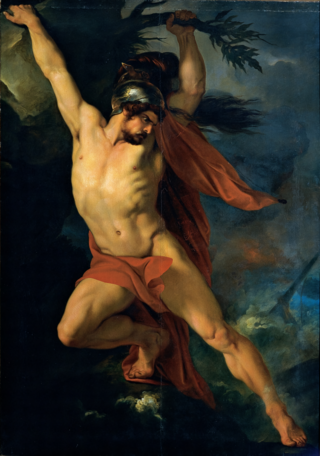
Ajax was a Greek mythological hero, son of Oileus, the king of Locris. He was called the "Ajax the Less", the "lesser" or "Locrian" Ajax, to distinguish him from Ajax the Great, son of Telamon. He was the leader of the Locrian contingent during the Trojan War. He is a significant figure in Homer's Iliad and is also mentioned in the Odyssey, in Virgil's Aeneid and in Euripides' The Trojan Women. In Etruscan legend, he was known as Aivas Vilates.
Agenor was in Greek mythology and history a Phoenician king of Tyre or Sidon. The Greek historian Herodotus, born in the city of Halicarnassus under the Achaemenid Empire, estimated that Agenor lived either 1000 or 1600 years prior to his visit to Tyre in 450 BC at the end of the Greco-Persian Wars. He was said to have reigned in that city for 63 years.
In Greek mythology, Glauce, Latin Glauca, refers to different people:
Eurytion or Eurythion (Εὐρυθίων) was a name attributed to several individuals in Greek mythology:

In Greek mythology, Anticlea or Anticlia was a queen of Ithaca as the wife of King Laërtes.
In Greek mythology, Autolycus was a successful robber who had the power to metamorphose or make invisible the things he stole. He had his residence on Mount Parnassus and was renowned among men for his cunning and oaths.
In Greek mythology, Antiphus or Ántiphos is a name attributed to multiple individuals:
In Greek mythology, Assaracus was a king of Dardania.
In Greek mythology, Bias may refer to the following characters:
In Greek mythology, the name Butes referred to several different people.
In Greek mythology, Eurypylus was the name of several different people:
Actor is a very common name in Greek mythology. Here is a selection of characters that share this name :
In Greek mythology, Peneleos or, less commonly, Peneleus, son of Hippalcimus (Hippalmus) and Asterope, was an Achaean soldier in the Trojan War.
In Greek mythology, Nireus was a king of the island Syme and one of the Achaean leaders in the Trojan War. He was renowned for his outstanding beauty, being described as the second most handsome man in the Greek camp after Achilles.
In Greek mythology, the name Clymene or Klymene may refer to:
In Greek mythology, the name Xanthus or Xanthos may refer to:
Merope was originally the name of several characters in Greek mythology.
In Greek mythology, Cycnus or Cygnus was the king of the town of Kolonai in the southern Troad.
In Greek mythology, Iphitos or Īphitus was an Oechalian prince and one of the Argonauts.
In Greek mythology, Arethusa may refer to the following personages:



